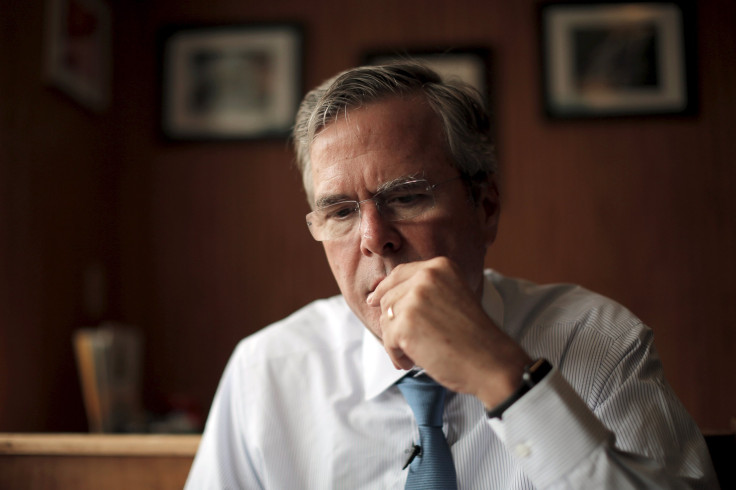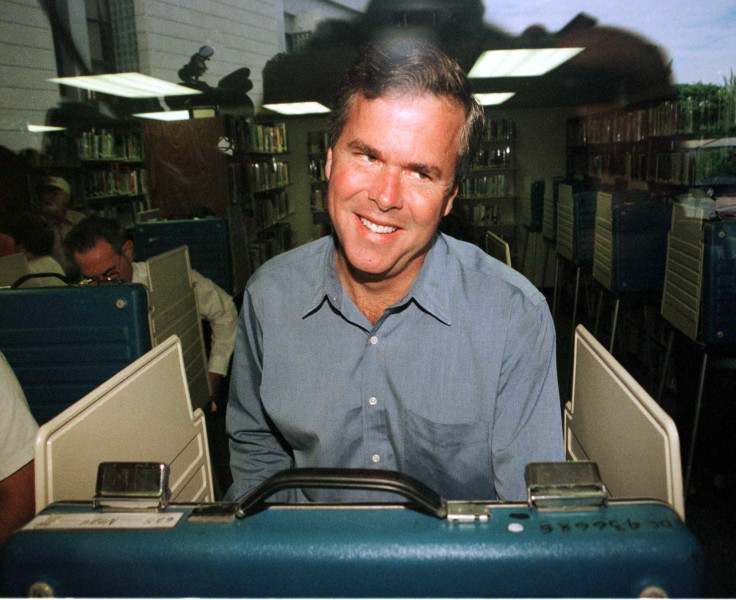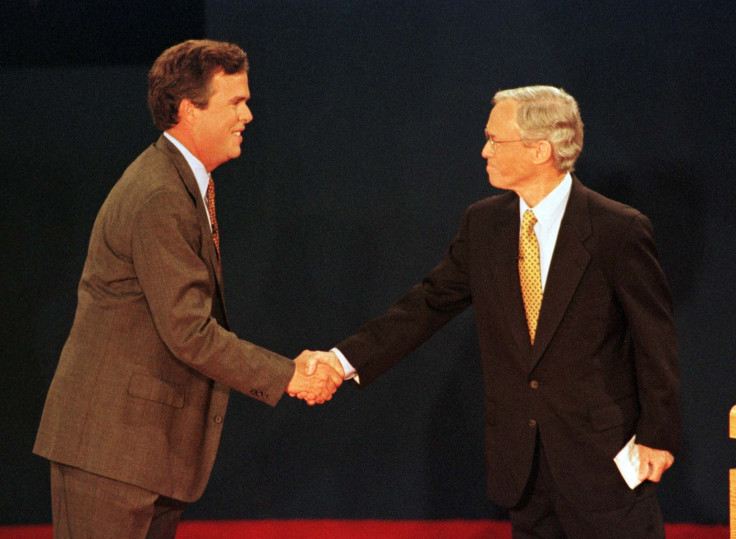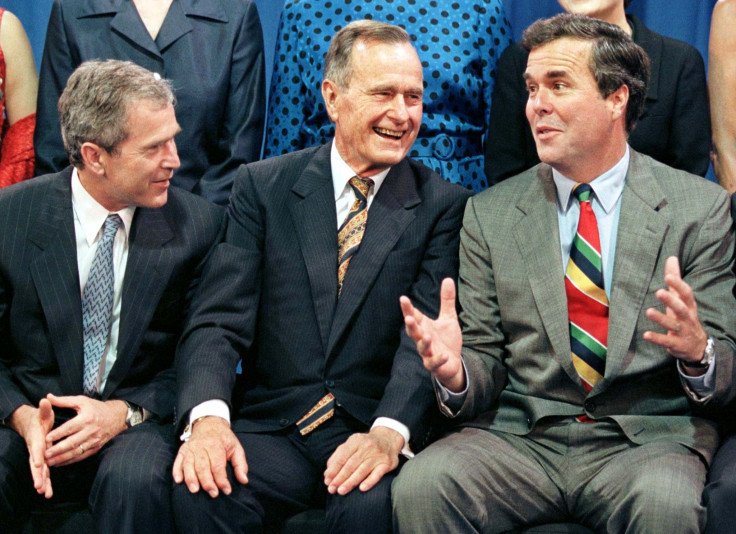Jeb Bush Has Always Been Bad At Campaigning: What 2016 Candidate Needs To Do To Save Presidential Campaign

In 1994, when a voter asked gubernatorial candidate Jeb Bush what he would do for black Floridians if elected governor, the young politician replied, “Probably nothing.” That was Bush’s first campaign for office, where he presented himself as a “head-banging conservative” who largely ignored minority voters, wanted to eliminate excess and sought to shake up the statehouse.
He was up against an unpopular Democratic incumbent, but voters were not ready for his brand of fiery conservatism. He lost in a devastatingly close election, and Bush went on to spend the next four years learning from his mistakes and preparing to win the governorship in 1998.
During that time, Bush refocused his image and moderated his language. When he ran again in 1998, he reached out to black and Hispanic communities and he spoke of “compassion” for Florida’s poor. He won by more than 10 points and came back in 2002 to win again, becoming Florida’s first Republican governor elected to a second term and cementing the narrative that a calmer demeanor and calculated outreach could bring him easy success.
Jump forward 17 years and Bush’s bid for the 2016 Republican presidential nomination is floundering. For months now, the former front-runner has struggled to move past lagging poll numbers and reassure worried donors, but he cannot seem to get much news attention beyond his feuds with Donald Trump. The third GOP debate will take place Wednesday night, and its focus on economic policy could present an opportunity for Bush to earn some redemption. But he'll need to do more than hold his own if he wants to change the downward trajectory of his presidential bid and avoid repeating old, unsuccessful campaign habits, Republican strategists said.

‘People Don’t Care About Him’
“Jeb was not a great campaigner” in his Florida days, said Robert Crew, who directs Florida State University’s master’s program in applied American politics and policy and who wrote a book about Bush’s time in Florida called “Jeb Bush: Aggressive Conservatism in Florida.”
Crew attributes much of Bush’s electoral success to unremarkable opponents and institutional support, both from the Bush family and from the Republican party. “The first time he got elected was when the Republicans got control of the [Florida] House and Senate since Reconstruction,” Crew added. “They were all hopped up to help him.”
Republicans won the history-making majority in both houses of the Florida Legislature in 1996, and Bush’s election to the governorship in 1998 marked the first time Republicans controlled both the legislature and the governor’s office anywhere in the South since Reconstruction. The prospect of this exciting milestone for the party gave his campaign an energy, and he held huge fundraising advantages over his opponents, according to Florida election filings.
Even when Bush lost in 1994, he outspent the incumbent Lawton Chiles thanks to his parents and other family-connected out-of-state fundraisers. Former president George H.W. Bush and former first lady Barbara Bush brought in about $1 million for the campaign each time they visited Florida, according to Crew's book. All of this exposure gave Bush early leads in the polls, but it didn’t necessarily endear him personally to voters.
“I don’t think people reacted in any overly emotional way. When Barack Obama ran, a whole new group of people came into politics because they were excited,” Crew said. “He [Bush] never was an emotionally connected guy like Bill Clinton or Ronald Reagan. People don’t care about him.”

Despite his unexceptional campaigning, Bush managed to have a significant impact on Florida politics. When he ran for and served as governor, experts say Bush was seen as a strong conservative who would stand by his principles and take action.
“He really dominated the political landscape,” said Matthew Corrigan, the chair of the University of North Florida’s department of political science and author of a book about Bush’s time as governor titled “Conservative Hurricane: How Jeb Bush Remade Florida.” Corrigan said he called his book “conservative hurricane” because that metaphor describes Bush’s two terms in the Florida statehouse. During his tenure, Bush championed tax cuts, created the nation's first statewide school private school voucher program and enacted significant legislation to protect the Everglades. “For his policy positions, they got passed,” Corrigan said.
But it's been years since his Florida accomplishments, and the Republican Party as a whole has shifted to the right, leaving Bush's public persona more toward the center than he could have imagined in 1994. Without the momentum of a new Republican majority like he had in Florida, Bush has to rely more on his own merits to win confidence and donors.
“It looks like a much different Jeb Bush than who ran in Florida. Even after ’94 when he moderated his tone then ran in Florida, he was seen as very conservative. Since he’s left in 2007, the Republican party has changed dramatically,” Corrigan said.
Repeating Mistakes
Bush approached the 2016 race expecting to maintain the establishment support he enjoyed as governor of Florida. Instead, big name Republican Party donors have scattered among him, Florida Sen. Marco Rubio and other candidates; in the first five months of the GOP primary, Bush's campaign has echoed the mistakes of his earlier contests in Florida. He has made several gaffes regarding black people and Asian "anchor babies," often appearing inarticulate in front of voters, and he has continued to rely on the group of establishment donors he does have, receiving just 7 percent of his third quarter funding from contributions under $200.
After entering the race with high approval ratings in June, Bush has seen his standing decline dramatically. He currently hovers around 7 percent in national polls, which puts him in fourth place not only behind outsiders Trump and Ben Carson, but also behind Rubio, his former protégée. He is doing slightly better in early primary state New Hampshire, where his campaign announced last week it will focus more efforts going forward, but polls there still put him in third place.
Increasingly, Bush has found himself responding to attacks from Trump on Twitter, such as when the New York business tycoon criticized Bush’s brother, former President George W. Bush for his handling of the 9/11 attacks, or said he relies too much on his parents’ money.
No @JebBush, you’re pathetic for saying nothing happened during your brother’s term when the World Trade Center was attacked and came down.
— Donald J. Trump (@realDonaldTrump) October 17, 2015“It’s been a long time since he’s run, I don’t think he’s adapted to the social media world that we live in,” Republican strategist John Feehery said. “You’ve got to say something interesting.”
Bush has so far not managed to come back from Trump’s attacks looking anything other than defensive. He is typically known as a wonky ideologue who would rather talk about policy than trade quips with other candidates. And while he has put out some careful policy proposals on issues such as job growth, energy and healthcare, he remains out of step with many Republicans on other issues, namely immigration and education. Bush's campaign did not respond to multiple requests for comment on this story.
'Substance Matters'
Political strategists see a few key areas where Bush needs to improve his operation. The main issues the former governor needs to address, according to experts, are his ability to capture voters' interest, his attitude of entitlement and his failure to prove he has the best policy solutions.
“Bush’s biggest problem is that he hasn’t been able to communicate that substance matters. He’s gotta be able to communicate that,” Feehery said. “He’s got this sense of entitlement that he’s doing us all a favor by him running, and he needs to get rid of that.”
Although Bush has said he wanted to approach his 2016 campaign with “joy,” he has been accused of being “low-energy” by Trump, and the media has picked up on his lack of enthusiasm, too. This past weekend, Bush told a crowd in South Carolina that he could be doing other things besides running for president.
"I’ve got a lot of really cool things I could do other than sit around being miserable, listening to people demonize me and me feeling compelled to demonize them. That is a joke. Elect Trump if you want that,” he said.

That attitude is a far cry from someone excited to get through the next eight or so months of primary campaigning and then potentially another several months of a general campaign.
Bush's safest bet for giving his campaign a jumpstart is focusing on his strong policy chops, strategists said. The first two Republican debates have not gone particularly well for the former Florida governor, despite his intelligence and experience. After his campaign announced it was slashing salaries and changing its focus Friday, Bush’s donors have been more worried about their political investment than ever.
The third Republican debate hosted by CNBC Wednesday night will focus on economic issues such as job growth, taxes and retirement -- topics Bush should be able to discuss with ease. But with the extra pressure of a struggling campaign, he'll need to exceed expectations to stave off his downward momentum.
“If Jeb is going to prove he can be president, he has to engage him in a substantive debate over the solutions,” David Merritt, a Republican strategist, said. “It’s on those grounds where all of the candidates stand a better chance at taking down Donald Trump.”
© Copyright IBTimes 2024. All rights reserved.






















